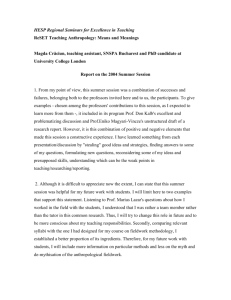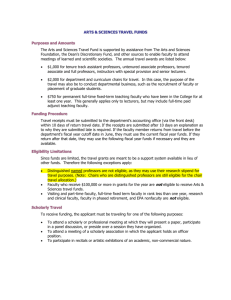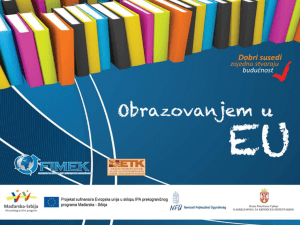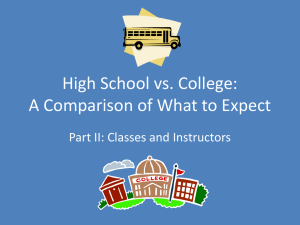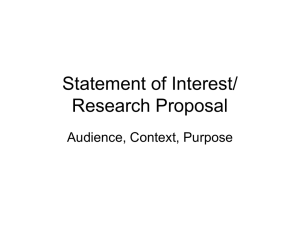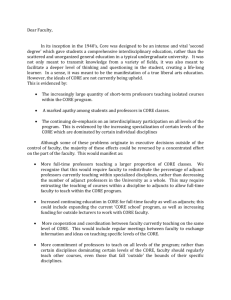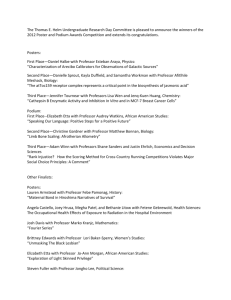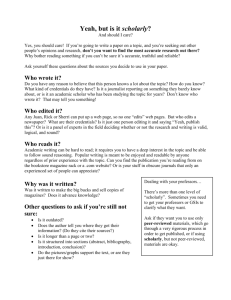Faculty Code of Ethics
advertisement
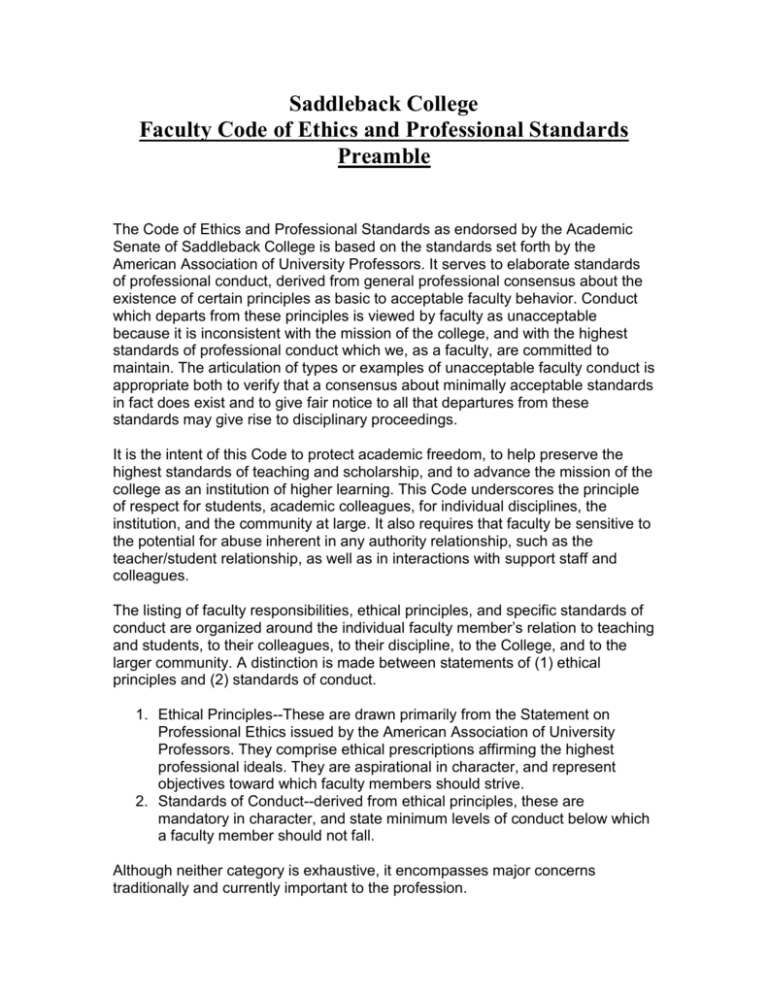
Saddleback College Faculty Code of Ethics and Professional Standards Preamble The Code of Ethics and Professional Standards as endorsed by the Academic Senate of Saddleback College is based on the standards set forth by the American Association of University Professors. It serves to elaborate standards of professional conduct, derived from general professional consensus about the existence of certain principles as basic to acceptable faculty behavior. Conduct which departs from these principles is viewed by faculty as unacceptable because it is inconsistent with the mission of the college, and with the highest standards of professional conduct which we, as a faculty, are committed to maintain. The articulation of types or examples of unacceptable faculty conduct is appropriate both to verify that a consensus about minimally acceptable standards in fact does exist and to give fair notice to all that departures from these standards may give rise to disciplinary proceedings. It is the intent of this Code to protect academic freedom, to help preserve the highest standards of teaching and scholarship, and to advance the mission of the college as an institution of higher learning. This Code underscores the principle of respect for students, academic colleagues, for individual disciplines, the institution, and the community at large. It also requires that faculty be sensitive to the potential for abuse inherent in any authority relationship, such as the teacher/student relationship, as well as in interactions with support staff and colleagues. The listing of faculty responsibilities, ethical principles, and specific standards of conduct are organized around the individual faculty member’s relation to teaching and students, to their colleagues, to their discipline, to the College, and to the larger community. A distinction is made between statements of (1) ethical principles and (2) standards of conduct. 1. Ethical Principles--These are drawn primarily from the Statement on Professional Ethics issued by the American Association of University Professors. They comprise ethical prescriptions affirming the highest professional ideals. They are aspirational in character, and represent objectives toward which faculty members should strive. 2. Standards of Conduct--derived from ethical principles, these are mandatory in character, and state minimum levels of conduct below which a faculty member should not fall. Although neither category is exhaustive, it encompasses major concerns traditionally and currently important to the profession. In the interest of maintaining professional standards, the members of the Academic Senate of Saddleback College have both the authority and the obligation to uphold and enforce this Code of Ethics and Professional Standards. Professional Responsibilities, Ethical Principles, and Standards of Conduct: I. Students Ethical Principle: "As teachers, professors encourage the free pursuit of learning in their students. They hold before them the best scholarly and ethical standards of their disciplines. They demonstrate respect for students as individuals, and adhere to their proper roles as intellectual guides and counselors. Professors make every reasonable effort to foster honest academic conduct and to ensure that their evaluations of students reflect each student’s true merit. They respect the confidential nature of the relationship between professor and student. They avoid any exploitation, harassment, or discriminatory treatment of students. They acknowledge significant academic or scholarly assistance from them. They protect their academic freedom." (American Association of University Professors Statement, 1990) Standards of Conduct: a. Faculty treat all students with fairness and respect. b. Faculty encourage the free exchange of ideas between themselves and students. c. Faculty conscientiously strive to be fair and balanced in their evaluation of student work. d. Faculty should not exploit their students for personal gain. e. Faculty should be fair and objective when providing references for students. f. Faculty shall not disclose information about students obtained in the course of professional service unless disclosure serves a compelling professional purpose or is required by law. g. Faculty-student personal relationships are unethical when they hinder any student’s academic progress or create a situation in which any student is either favored or negatively impacted on grounds other than academic performance. h. Because a teacher/student relationship is inherently unequal, a member of the faculty should not enter into a sexual relationship with his/her student while engaged in a professional relationship. i. Faculty have the obligation to meet classes as scheduled, to maintain office hours and to provide reasonable means for student access to course information. II. Colleagues Ethical Principle: "As colleagues, professors have obligations that derive from common membership in the community of scholars. Professors do not discriminate against or harass colleagues. They respect and defend the free inquiry of associates. In the exchange of criticism and ideas professors show due respect for the opinions of others. Professors acknowledge academic debt and strive to be objective in their professional judgment of colleagues. Professors accept their share of faculty responsibilities for the governance of their institution." (AAUP Statement, 1990) Standards of Conduct: a. Faculty, whether acting in academic or administrative capacity, treat each other with fairness and respect, and conduct themselves with dignity and restraint in all exchanges with colleagues. b. Faculty defend the right of their colleagues to academic freedom. c. While critical evaluation is an essential part of academic activity, faculty should be fair and objective when presenting a professional judgment on their colleagues’ work and shall not knowingly make false or malicious statements about a colleague. d. Faculty shall avoid threatening or abusive behavior or language, verbal harassment or intimidation of another member of the faculty, under any circumstance while on the college campus. e. A faculty member shall not knowingly misrepresent the views/positions of colleagues to further their own position or point of view. III. Disciplines Ethical Principle: "Professors, guided by a deep conviction of the worth and dignity of the advancement of knowledge, recognize the special responsibilities placed upon them. Their primary responsibility to their subject is to seek and to state the truth as they see it. To this end professors devote their energies to developing and improving their scholarly competence. They accept the obligation to exercise critical self-discipline and judgment in using, extending, and transmitting knowledge. They practice intellectual honesty. Although professors may follow subsidiary interests, these interests must never seriously hamper or compromise their freedom of inquiry." (AAUP Statement, 1990) Standards of Conduct: a. Faculty maintain currency in their academic fields. b. Faculty exhibit intellectual honesty and integrity in all scholarly endeavors. c. Faculty work toward improving the quality of instruction. d. Faculty should not denigrate other disciplines or undermine the confidence of students in other duly approved programs or academic departments of the college. IV. College Ethical Principle: "As members of an academic institution, professors seek above all to be effective teachers and scholars. Although professors observe the stated regulations of the institution, provided they do not contravene academic freedom, they maintain their right to criticize and seek revision. Professors give due regard to their paramount responsibilities within their institution in determining the amount and character of the work done outside it. When considering the interruption or termination of their service, professors recognize the effect of their decision upon the program of the institution and give due notice of their intentions." (AAUP Statement, 1990) Standards of Conduct: a. In accepting a position at the College, faculty assume obligations to contribute to the college community. They should act so as to secure the good of the College. Such activities include, though are not limited to, participation in the governance and administration of the College through membership on committees and organizations at various levels. b. Faculty assume the responsibility of informing themselves of, and abiding by the policies established for the orderly conduct of affairs of the College. c. Faculty avoid potential conflicts of interest unless, after full consultation, they have the approval of the appropriate College authority to whom they are responsible. d. Faculty avoid engaging in outside professional activity that conflict with their responsibilities and duties to their College appointments. e. Faculty treat College support staff with fairness and respect and should not exploit support staff for personal gain, or abuse them either verbally or physically. V. Community Ethical Principle "As members of their community, professors have the rights and obligations of other citizens. Professors measure the urgency of these obligations in the light of their responsibilities to their subject, to their students, to their profession, and to the institution. When they speak or act as private persons they avoid creating the impression of speaking for or acting on behalf of their college or university. As citizens engaged in a profession that depends upon freedom for its health and integrity, professors have a particular obligation to promote conditions of free inquiry and to further public understanding of academic freedom." (AAUP Statement, 1990) Standards of Conduct: a. In their roles as representatives of the College, faculty should avoid misrepresentation of personal views as a statement of position of the College or any of its agencies. (Approved by the Saddleback College Academic Senate, October 14, 1998)
